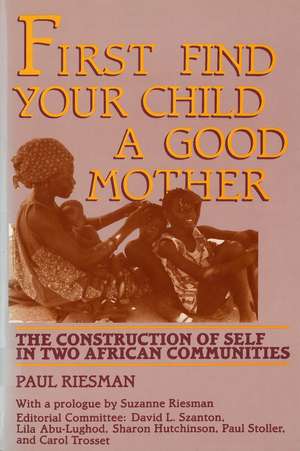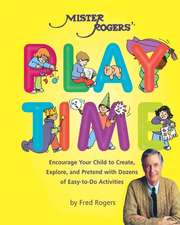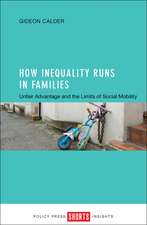First Find Your Child a Good Mother: The Construction of Self in Two African Communities
Autor Paul Riesmanen Limba Engleză Paperback – apr 1992
Through a systematic comparison of the life circumstances, child-rearing practices, and personalities of the FulBe and their former slaves, the RiimaayBe, this book develops an alternative theory of the way personality is formed in the Fulani society of West Africa. Riesman discusses the different characters, economies, and life plans of adult men and women of both groups, focusing on their ideas about the value of relatives. He further presents detailed observations of child-rearing practices, and concludes that the FulBe and RiimaayBe do not differ in these practices. Contrasting Fulani and Western notions of parenting, he suggests that child-rearing practices are themselves irrelevant to the formation of adult personality, but that a people's ideas about the meaning of life, social relations, and the development of character are very important. Finally, Riesman outlines a sociocultural theory of personality and its formation, and uses this theory to make sense of the differences between FulBe and RiimaayBe.
Preț: 292.29 lei
Nou
Puncte Express: 438
Preț estimativ în valută:
55.93€ • 58.04$ • 46.75£
55.93€ • 58.04$ • 46.75£
Carte tipărită la comandă
Livrare economică 18 martie-01 aprilie
Preluare comenzi: 021 569.72.76
Specificații
ISBN-13: 9780813517681
ISBN-10: 0813517680
Pagini: 264
Ilustrații: 1
Dimensiuni: 152 x 229 x 20 mm
Greutate: 0.45 kg
Ediția:None
Editura: Rutgers University Press
Colecția Rutgers University Press
ISBN-10: 0813517680
Pagini: 264
Ilustrații: 1
Dimensiuni: 152 x 229 x 20 mm
Greutate: 0.45 kg
Ediția:None
Editura: Rutgers University Press
Colecția Rutgers University Press
Notă biografică
Paul Riesman was a professor of anthropology at Carleton College and author of Freedom in Fulani Social Life. After Paul Riesman's death in 1988, this book was completed with the assistance of David L. Szanton (University of California, Berkeley), Lila Abu-Lughod (Princeton University), Sharon Hutchinson (University of Wisconsin, Madison), Paul Stoller (West Chester University), and Carol Trosset (University of Virginia).
Cuprins
List of Illustrations
Preface
Acknowledgments
Prologue
Reflexivity in Humanistic Anthropology: by Lila Abu-Lughod
1 Introduction
2 Global Fulani Society
3 Economy
4 What is Life All About
5 Infancy and Early Childhood
6 Later Childhood
7 Child Development in Fulani Ethnopsychology
8 Self, Identity, and Personality
9 Conclusion
Theoretical Implications, by Carol Trosset
Notes
Bibliography
Index
Preface
Acknowledgments
Prologue
Reflexivity in Humanistic Anthropology: by Lila Abu-Lughod
1 Introduction
2 Global Fulani Society
3 Economy
4 What is Life All About
5 Infancy and Early Childhood
6 Later Childhood
7 Child Development in Fulani Ethnopsychology
8 Self, Identity, and Personality
9 Conclusion
Theoretical Implications, by Carol Trosset
Notes
Bibliography
Index
Descriere
Through a systematic comparison of the life circumstances, child-rearing practices, and personalities of the FulBe and their former slaves, the RiimaayBe, this book develops an alternative theory of the way personality is formed in the Fulani society of West Africa. Riesman discusses the different characters, economies, and life plans of adult men and women of both groups, focusing on their ideas about the value of relatives. He further presents detailed observations of child-rearing practices, and concludes that the FulBe and RiimaayBe do not differ in these practices.






